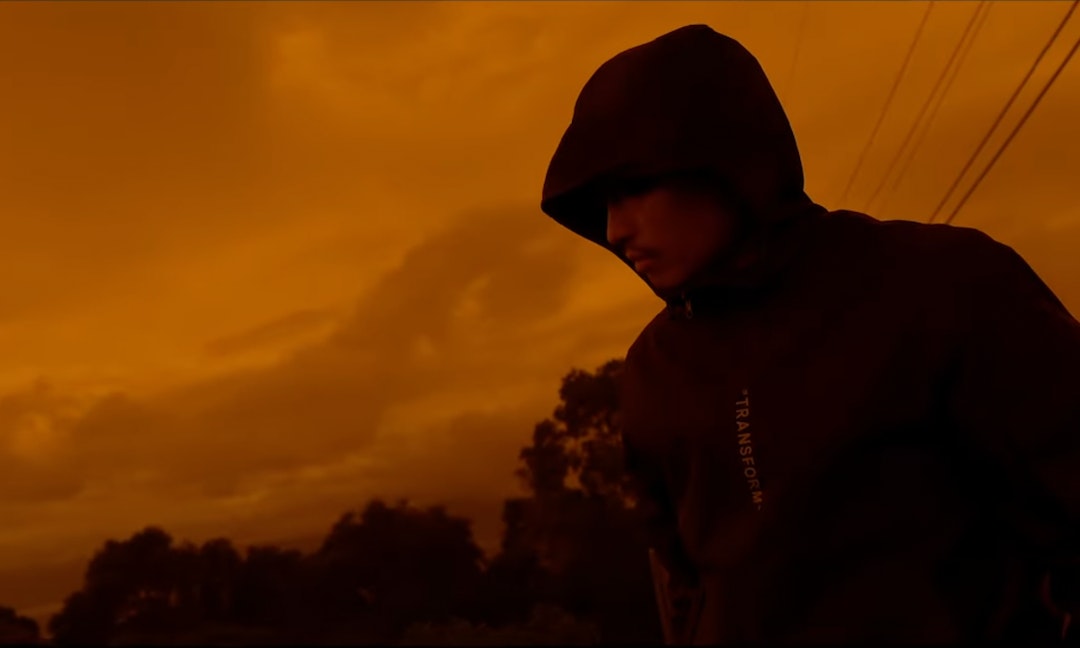
Inspired by the Unabomber — an ominous phrase, to be sure — and Taiwanese bombers manqué Hu Tsung-hsien (胡宗賢) and Chu Ya-tong (朱亞東), who in 2013 placed bombs on a High Speed Rail train and near a lawmaker’s office, writer-directors Hou Zong Hua (侯宗華) and Hong Yu Yuan’s (洪裕淵) The Bomber (炸彈客) is a Taiwanese no-budget indie with mostly first-time actors shot (by Hong) in the style of Darren Aronofsky’s 𝜋 (1998), but colorized in desaturated tones unless deliberately stylized with amber (Hou was also the colorist, it feels important to note) and severely lacking establishing shots and a carpenter’s level. It’s so incompetent that it has to be intentional, and too earnest to be camp. So what exactly is this 78-minute film, so short that I didn’t finish my popcorn?
Hou plays Tak, a former top-flight lawyer who now works as a welder at a small machine shop. He became disillusioned with the law when his client, a key witness in a wide-ranging government graft case (played by Peoplefish Poetry Society 人間魚詩社 vice-chair Chen Jian Yu 陳建宇), was assassinated by car, and his friend, national legislator Ah Qi (Wang Xiao Cheng 王孝程), pled with him to drop it. But blue collar life just reveals a society riddled with corruption, abuse, and injustice.
He gets radicalized into making triacetone triperoxide (TATP) explosives, first to avenge his new friends and coworkers (including Lam Wing-kee 林榮基, owner of the Hongkonger-in-exile dissident bookstore Causeway Bay Books Taiwan), then to take revenge for his own sake on the assassin, newly minted mafia boss Wang Bao Cheng (Yuan Yi Sheng 源一聖). He gets fired, so to maintain cover, he takes on high-profile corporate cases offered by Ah Qi.
Up to this point, the main inspiration is Hu, who was also an elite lawyer, and some of whose cases are named in the film. He tried to bomb people he held a personal grudge against, but fortunately Chu and his attempts were thwarted (Chu did it for money).
The film’s turn to mathematician and luddite Ted Kaczynski comes when Tak, torturing Wang, learns that the corruption is broader and deeper than previously reported. He goes on a random bombing campaign to get his manifesto read on air. When the presidential spokesman (Lin Bo Xun 林柏勛) acquiesces, the scene cuts to an imagined scenario of Tak standing at the podium, delivering a “STELLAAAAA!!!”-level melodramatic monologue (editing also by Hou).
The manifesto itself? A horseshoe-theory mix of universal basic income, no income for elected officials and representatives, and violent rhetoric about how society must be destroyed and remade, the latter echoing Thomas Jefferson’s oft-misused quote, “The tree of liberty must be refreshed from time to time with the blood of patriots and tyrants.” After that, the legislature stalls, Tak plants his bombs, the cops close in — you get the idea.
There’s a subplot revolving around Snow (Qiu Xue Yan 邱學妍), daughter of the assassinated witness, who’s now a YouTuber covering the polarized public opinion of the bomber. From this, the political demands, and the incessant hysterical Taxi Driver (1976) voiceovers (sound designed poorly by Hou), I initially viewed the film as agitprop. But agitating against who? A corrupt government in the pocket of big business that uses the mafia to do its dirty deeds, as was actually the case in Taiwan’s past? Or a psychologically unstable incel with an apocalyptically binary moral worldview? Like Travis Bickle and his obsession with New York City’s “scum,” Tak drones on about “the devil.” But here, there’s no external perspective, no Betsy, to throw the protagonist’s unhingedness into relief.
Then there’s the fact that Snow ends up joining a cult led by an Indian guru (Prem Purswaney) who worships millenarian god Agni. Like the ending of Dragonslayer (1981), it seems to be saying that when all progress is foreclosed, only religion can offer (false) comfort. Then again, the Cult of Agni doesn’t actually do anything.
Judging from the ludicrously hyperbolic ad copy (in Mandarin), the filmmakers had too many ideas to know what to do with. Rather, they wanted to include all of what they saw as the predominant social concerns of the day, but the only unifying connection they could find was the raw and undiluted howl for change. In such a world, there is no baseline, hence the canted angles, but people seek one anyway, in money (Tak’s former boss), power (Ah Qi), Manichaeism (Tak), or religion (Snow).
By conventional filmmaking standards, The Bomber is a juvenile expectoration. But the strength of the filmmakers’ vision militates against the value of those very conventions. It’s like — dare I say it? — a negative image of Citizen Kane (1941).
READ NEXT: ‘Red Line’ Makes Your Heart Race in More Ways Than One
TNL Editor: Bryan Chou (@thenewslensintl)
If you enjoyed this article and want to receive more story updates in your news feed, please be sure to follow our Facebook.







